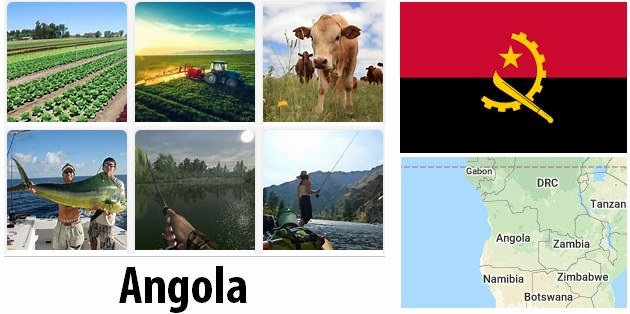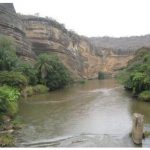Agriculture and fishing
Angola has fertile land and a varied climate that provides good conditions for agriculture, especially in the central highlands. In the south there are vast areas suitable for grazing land. However, during the 1975–2002 civil war, agriculture was paralyzed as millions of people were forced to flee their land.
- CountryAAH: Comprehensive import regulations of Angola. Covers import prohibitions and special documentation requirements for a list of prohibited items.
This, together with neglect, transport problems, capital shortages and drought, has destroyed large parts of agricultural production and created malnutrition and even starvation. Angola imports a large part of its food and much food comes as emergency aid.
Before the war, two-thirds of the population supported themselves through cultivation, a proportion that was later halved. Most farmers grew only for their own family’s consumption and productivity was low. The most important food crops are cassava, beans, corn, millet, rice, bananas and sweet potatoes. For Angola defense and foreign policy, please check prozipcodes.
Before independence in 1975, agriculture produced a surplus through commercial cultivation of coffee, cotton, sugar and sisal hemp (a plant that produces strong fibers). The country was self-sufficient on everything except wheat. Angola was the main exporter of basic food in sub-Saharan Africa and the world’s fourth largest exporter of coffee beans. But when the Portuguese left, the plantations were nationalized, which in many cases led to neglect. During the war, the production of coffee and other export crops ceased almost entirely.
Already in the 1980s, some state agriculture and collectively began distributing land to private small farmers. As a result, there were uncertainties about the ownership of the land. Many city dwellers with the “right contacts” have acquired land and driven away small farmers without formal right to the land they cultivate. Many refugees and former guerrillas who returned to their homes after the war have ended up in conflicts as competition for land has increased. A new law on land rights was adopted in 2004, but it did not offer a solution for the millions of poor rural workers who do not have approved property rights documents.
Many of those who returned home after the war encountered another problem: in large parts of the country, undetected landmines remained in the ground. Despite all the problems, the production of small farmers has increased significantly after the peace, albeit from a very low level. In commercial agriculture, however, the recovery has been weak. One problem is high costs compared to cheaper food imports.
Angola has large resources of timber, especially in the rainforests in the north. Cabinda province is rich in valuable woods such as sandalwood, rosewood and ebony. From colonial times, Angola has plantings of eucalyptus, pine and cypress, which are used for fuel and papermaking. Cold cutting for new cultivation and firewood as well as shredding during the war has greatly reduced the forest stock. Commercial forestry is insignificant compared to the years before independence.
Traditionally, an important part of the Angolan protein needs has been met by small-scale fishing along the coast and in the many rivers and small lakes. Angola participates in one of the fishiest waters in the world through the Benguela stream to the south. But the fishing fleet has shrunk drastically after independence and most of the fishing is now carried out by commercial Angolan and foreign companies. In some areas, their trawlers have reduced the supply of fish, which has affected the approximately 20,000 local fishermen.
FACTS – AGRICULTURE
Agriculture’s share of GDP
10.0 percent (2017)
Percentage of land used for agriculture
47.5 percent (2016)
- Abbreviationfinder.org: Offers how the 3-letter acronym of AGO stands for the state of Angola in geography.
2017
November
The former president’s daughter is dismissed
November 15
President João Lourenço dismisses Isabel dos Santos as head of state-run oil company Sonangol. Six board members who are believed to be allies with Dos Santos may also join. Isabel dos Santos, who is the daughter of Lourenço’s representative José Eduardo dos Santos, is considered to be Africa’s richest woman with a wealth of more than 2.8 billion euros. During the campaign before the August election, Lourenço promised to fight corruption and nepotism . New chief of Sonangol becomes oil minister Carlos Saturnino.
October
Optimistic forecast by the new president
October 16
President Lourenço sets an optimistic tone in his first speech before Parliament. He says he expects the economy to grow by 2.1 percent in 2017, significantly better than the IMF ‘s 1.5 percent forecast. In 2016, the Angolan economy declined by 0.9 percent. The new president also believes that inflation will fall from 42 percent to 22.9 percent during the year. He says that planned tax cuts for companies investing in the country should broaden the business sector and give new impetus to the economy, which has been hit hard by the falling oil price.
September
President Lourenço forms a new government
September 26th
João Lourenço is installed as president and thus succeeds José Eduardo dos Santos, who has been in the post for 38 years. Two days later, Lourenço forms a new government, which is largely made up of old MPLA members who are loyal to dos Santos. Several key ministers such as the Minister of the Interior, the Minister of Finance and the Minister of Agriculture may retain their jobs.
The election result is appealed
September 9th
Three opposition parties with Unita at the forefront appeal the election result and ask the Constitutional Court to annul it.
August
MPLA wins parliamentary elections
August 23rd
According to official results, MPLA wins the parliamentary election with 61.7 percent of the vote, while Unita gets 26.6 percent and Casa-CE 9.5 percent. Compared to the 2012 election, MPLA loses ten percentage points. Unita and Casa-CE increase their voting shares by just over 8 and 3 percentage points respectively. However, the opposition parties are not satisfied but question the result and complain that they have had difficulty making their voices heard during the election campaign as MPLA largely controls the entire media market. They also point out that voters in areas where the opposition has strong support were forced to go to remote polling stations to cast their votes. A few days after the election, Unita announces that the party intends to go to court to have the result reviewed.
The election also means a shift in the presidential post as the winning party automatically receives the presidential post and the incumbent president José Eduardo dos Santos does not stand for re-election. New president becomes MPLA’s top candidate in the election, João Lourenço, who was, among other things, Minister of Defense. The change of presidential post takes place in September.
July
New law gives dos Santos a chance to continue influence
July 21st
Parliament adopts a law that makes it almost impossible for future presidents to replace the heads of the country’s security services; According to the law, the managers may only be dismissed under certain specified circumstances, for example if they reach a certain age or if they commit a crime. The law is condemned by the opposition, which says it is a way for outgoing President José Eduardo dos Santos to maintain his strong influence over the military, the police and the intelligence service even after the August elections.
June
One killed and several injured in separatist protest
June 27
A man is killed and 13 injured when police shoot at protesters in the city of Luzamba to Cuango. Thousands of people have gathered there to protest the brutality shown by police against separatists who want the eastern Lunda Chokwe region to become an independent state.
Unita protest before the election
June 3
Thousands of Unita supporters are demonstrating in Luanda, Huambo and several Angolan cities and demand that the August 23 elections be conducted under fair terms. The target of the protests is André da Silva Neto, the president of the electoral commission, who is accused of rigging the procurement of services needed before the election. According to Unita, over 100,000 people participate in the demonstrations, while MPLA faithful press indicates significantly lower numbers.
April
Tightened border guard in the north
April 19
Surveillance of the border in the north towards Congo-Kinshasa has since intensified, more than 9,000 Congolese migrated into Angola from unrest in the Kasair region. The Chief of Police says that the increased surveillance is to prevent armed groups from entering the country.
Prison for election protests
April 23
Seven opposition activists are sentenced to 45 days each and fined for participating in an unauthorized demonstration for the demand for honest elections. They are convicted of “rebel activity and conspiracy with criminals”.
Parliamentary elections in August
April 24
The government decides that parliamentary elections will be held on August 23. The election is also an indirect presidential election, as the person at the top of the winning party’s list automatically presides. The incumbent President Eduardo José dos Santos has announced that he does not want to be re-elected. Instead, Defense Minister Joäo Lourenço will top the MPLA’s list.
March
Prison for dome plans
March 15th
Eight men accused of planning a coup d’etat are sentenced to prison for between four and ten years. The men are described as leaders of a group of 35 former members of the Unita guerrilla who must have attempted to overthrow the president in January 2016. Unita has denied involvement in any coup plans.
February
The President announces his departure
February 3
President José Eduardo dos Santos announces that he will resign in connection with this year’s parliamentary elections. He thus leaves the presidential post he held for nearly 38 years; he took office in September 1979. Dos Santos is scheduled to be replaced by Defense Minister João Lourenço.








